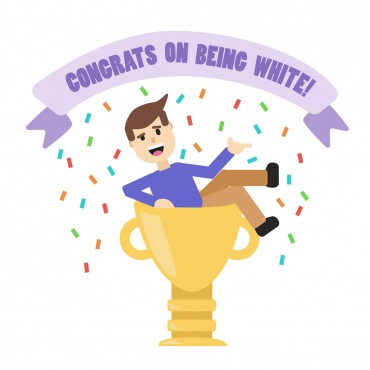The ‘cultural appropriation prize’, proposed by then-editor Hal Niedzviecki in an issue of Write magazine dedicated to Indigenous writers and the following bandwagon of high-profile white Canadians who publicly jumped on board shouldn’t surprise you.
Eurocentric views create the illusion of privileged entitlement to, well, everything. This mentality is ingrained in Canadian society. Welcome to what my world looks like, having to witness or experience things like this every day.
Indigenous lands have been stolen, exploited, and claimed by the Canadian settler state, and that same western conquest mentality applies to cultures as well. Cultural appropriation is a colonial mentality that demands theft, exploitation, and ownership of peoples and cultures.
It is why Halloween stores are filled with costumes of caricatures from cultures around the globe; why Stephenie Meyer’s Twilight, a novel series that heavily uses indigenous stories, is a billion dollar industry; and why J.K. Rowling is now doing the same thing in her newest fiction novel Magic in North America. White people want to naturalize cultural appropriation and this ‘cultural appropriation prize’ is a shining example of that.
Literature has always participated in the appropriation of non-white cultures as well as in the othering and exoticizing of them. This started with early invaders journaling their experiences which created a market for the consumption of these ‘new and exotic’ worlds that were being discovered. These stories were never told by the people of those worlds and cultures — they were always told through white invaders. To this day, there is still a fetish for the white storyteller — the white gaze that looks into other worlds and creates a fantasy.
Some of the first ‘indigenous stories’ were published by anthropologists who extracted indigenous stories and published them, often without permission and without ever sharing profits that were made. E. Pauline Johnson, an indigenous writer, created marketable performances and texts that would appease a white audience in the late 18th century by performing as an indian princess caricature who transformed into a ‘civilized’ Victoria woman. How has any of this changed? The need for indigenous texts to be tailored for the consumption of a white audience still exists.
White people are the target literary market and they are also the gatekeepers of publishing. I am an indigenous writer working on my second novel, but I have not yet published my first novel as white publishers and editors have asked me to change too much to make my work marketable and profitable to white Canada. Instead of publishing my novel as is, white Canada instead wants my story to be told through a white person and then have them receive an award for it!
When you do pick up an indigenous-authored text, do you know what you’re holding in your hands? Do you want to? Understand this — if you’re in North America, you are reading this on stolen land. Do you know the name of the indigenous peoples of the land you are on? When you hold an indigenous-authored text in your hands, you are holding centuries of intersecting power structures of colonialism, dispossession, capitalism, patriarchy, and genocide — in addition to indigenous resistance, knowledge, traditions, cultures, and languages.
Because of the current colonial ‘relationship’ between the Canadian state and indigenous peoples, indigenous literature is not just any other kind of literature. These colonial power structures exist within literature, and the consumption of it, as well in classrooms where literature is being taught and studied. This is why Canada would rather have indigenous stories told by white people so that they do not have to face the reality of their place and participation in a colonial state. Canada wants to hold onto the fantasy of a liberal multicultural nation in which we all peacefully, lovingly, and equally co-exist.
Markets are being developed on the appropriation of non-white cultures around the world and literature is no exception. Calling out cultural appropriation is a people of color driven movement to create accountability for the theft and misuse of cultures, and to bring awareness to the forefront for the dismantling of white supremacist power structures.
If you are a white writer, you can make the choice not to use the culture and stories of people of color. As a publisher or editor, you can choose to publish, support, and invest in writers of color. This choice is your privilege. Canada, don’t create and appropriate.








